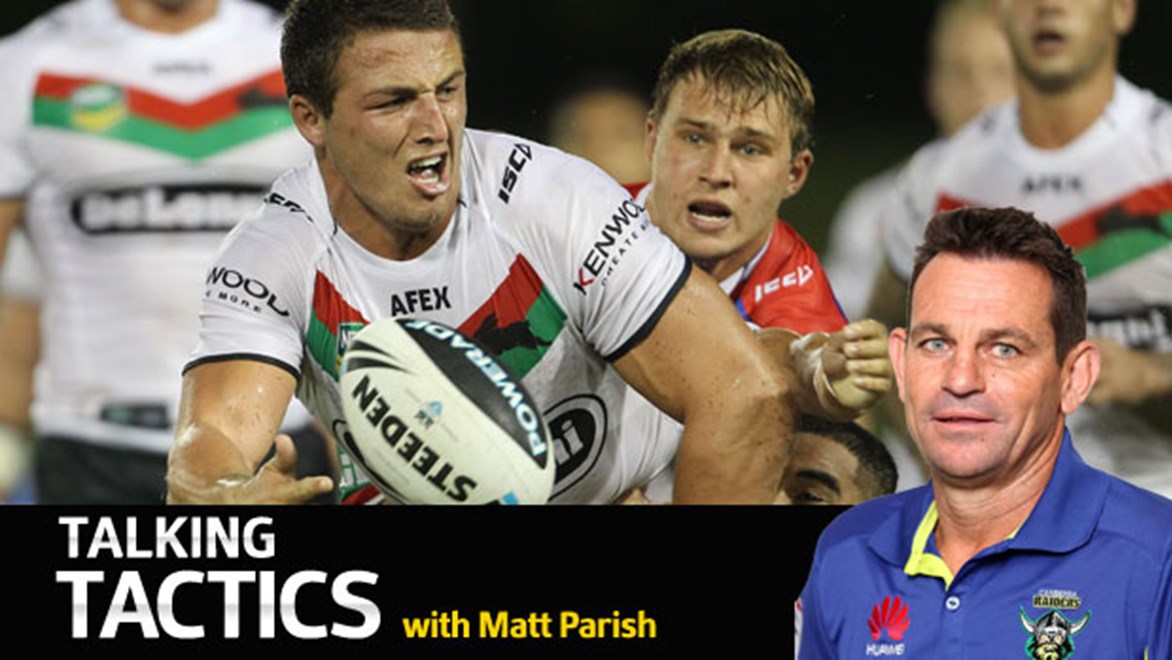

In 2014, NRL games have become tight and tense affairs which focus on defence and structure in order to keep opposition teams low on the scoreboard. Coaches have to come up with ways to get around these tight defensive structures - and the offload is back in vogue with teams as they look to break this defensive cohesion.
The beauty of a good offload is that it creates second-phase play which interrupts these defensive patterns and gives your support players like fullbacks, halves and hookers, the chance to find a weak point in an unstable defensive line.
In 2014, when most mentors are coaching their teams to get numbers in the tackle in an attempt to slow down the play-the-ball, coaches are starting to realise that the offload is their secret weapon. Like a buried treasure map, some coaches are dusting off the strategy guidelines and encouraging their forwards to look for offloads whenever possible.
The reason? Offloads are a very good way to break up well-structured defensive lines as they overcome group tackles, create gaps and tire your opponents by forcing second efforts.
Sure, a poor offload is still a bad play - but a good offload is worth its weight in gold.
With this season’s competition as tight as ever with four teams on 10 points, it’s interesting to note where the top runners rank with the number of offloads they tally. The Bulldogs (first on the ladder) are ranked ninth for the number of offloads they have produced this season, the West Tigers (second on the ladder) are third, the Sea Eagles (third on the ladder) are fourth and the Titans (fourth on the ladder) are… first.
The offload 'mania' of the early 1990s was infectious and like all crazes it got out of control. Players pushed the passes in their own territory, or passed to players under pressure. Eventually, the ‘offload bubble’ burst and offloads became a rarity, especially when the Super League days emerged.
In most teams there are skilful players who are capable at offloading and often you find these players have a large physical presence, with a high level of skill.
The great Artie Beetson, a big ball-playing forward, was renowned for being able to slip a great pass while falling and achieving a pre-line pass to create opportunities for his team. Likewise Steve Roach, the tough Balmain, NSW and Australian prop of the '80s, was also able to create the second phase play for playmakers like Ellery Hanley and Mick Neil to play off the back of. While he will always be known for his toughness and willingness to cart the ball forward no matter who was in front of him, we should also acknowledge the great pair of hands 'Blocker' had and his skill at being able to pop passes with three defenders hanging off him.
Forwards nowadays cannot just tuck the ball under their arms and make a hit-up. They all need to be skilled and be able to pass the ball, either pre-line or in the collision.
So with defence being a priority, there has been some correlation between offloads and winning games in 2014, as some teams are close to unstoppable when their players are offloading.
The Titans' attack this year has been impressive and they have used the offload to their advantage to create opportunities. They have many players who have an ability to promote the ball, with Greg Bird, Nate Myles, Dave Taylor and, surprisingly, hooker Paul Carter. This creation of second-phase play gives the likes of Albert Kelly and Aidan Sezer room to move.
And while his team has struggled at times this season, any team with Sam Burgess in it is always going to compete. He is ranked first in the NRL for offloads and at times he and his Rabbitohs teammates have been unstoppable.
Burgess is able to combine his extraordinary athletic skill and strength with his one-handed basketball grip on the ball, challenging opposition teams to stop him while effortlessly popping balls for support runners. Another positive from this is for the fans, as it creates some uncertainty when he runs the ball and fans are on the edge of their seats to see what they can create.
Not surprisingly, Origin and Australian players Corey Parker and Andrew Fifita are ranked second and third in offloads this season. These two players are hard to handle and defensive coaches are always looking at ways to wrap the ball up and get numbers around the tackle when they have the ball.
Trent Merrin is one of the form forwards in the competition and often ignites his Dragons team with scoring opportunities against well-structured defensive teams by using offloads. He uses some very good agility, combined with the ability to get the ball away in the tightest of situations.
So rather than focus on which players are offloading and how successful their offloads have been, I have tried to establish a correlation between offloads and winning percentage.
Out of the 56 games played so far this season, there have been five games where each team made the same amount of offloads, leaving 51 games where one team had more than the other. In 38 of these games, the team making more offloads won with a strike rate of 74.6 per cent.
So the message to teams with struggling attack is simple: you need to give offloading a go!
